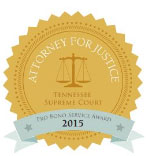On July 1, 2015, the Tennessee Supreme Court issued its opinion in Action Chiropractic Clinic, LLC v. Hyler, et al., holding that a patient’s “Assignment of Rights” to a medical provider must be clear and unambiguous in order to be enforceable by the medical provider. The opinion provides critical guidance to medical practices seeking to protect their right to payment from third party legal settlements.
In Action Chiropractic, the patient received chiropractic treatment due to injuries sustained in an automobile accident. The patient was not the driver of the vehicle, and had made a claim against the driver’s automobile liability insurance company, Erie Insurance Exchange. Action Chiropractic agreed to defer receipt of payment from the patient until the patient’s legal claim against Erie was settled, provided that the patient executed an Assignment of Rights directing Erie to either (i) pay Action Chiropractic directly in the amount of the patient’s chiropractic bills, or (ii) make the check payable to the patient but mail the check to Action Chiropractic.
In determining that the Assignment of Rights signed by the patient was not effective, and therefore unenforceable, the Court analyzed the language of the “Assignment of Rights” provision signed by the patient. Importantly, the Assignment of Rights directed the patient’s health insurance, automobile insurance, or other party obligated to pay medical expense benefits to the patient to make the payment directly to Action Chiropractic. Erie did not honor the Assignment of Rights, but instead made the payment directly to the patient. The patient, in turn, failed to pay Action Chiropractic and Action Chiropractic filed suit seeking to enforce the Assignment of Rights.
The Supreme Court noted at the outset that Erie was not obligated to honor the Assignment of Rights for several reasons:
1. Erie was not the patient’s insurance provider, but was the insurance provider for the third-party driver of the vehicle. Erie did not consent to the Assignment of Rights and had no privity of contract with Action Chiropractic. Therefore, Action Chiropractic was merely an incidental beneficiary of the settlement payment and had no right to enforce the Assignment.
2. Even if Action Chiropractic did have a right to enforce the Assignment, the Assignment was nonetheless unenforceable under Tennessee law because the clear language of the Assignment purported to make an assignment of medical expense benefits payable to the patient under the patien’s own insurance policy. Erie was not the patient’s insurance provider, but was the insurance provider for the third-party driver of the vehicle.
3. In addition, the Court held that the Assignment language was narrowly tailored to payment for “medical expense benefits,” and did not extend to settlement proceeds paid in settlement of a legal claim.
The takeaway from Action Chiropractic is that medical providers must have very specifically drafted assignment agreements to protect their right to deferred payment from or on behalf of patients who are receiving treatment for injuries caused by a third party.
The assignment agreements should include language assigning payments received by the patient from any source (including settlement proceeds or court judgments/verdicts from legal claims), should specifically include claims paid by any insurance provider or other third party making payment for the patient’s injuries (not only the patient’s insurance provider), should include the written consent of the insurance provider to be bound by the assignment, and should be clear and ambiguous with regard to what is being assigned.
As an additional risk management measure, Griffin Law advises medical providers to obtain a separate written agreement with the patient whereby the patient agrees to remit full payment to the medical provider promptly upon receipt of any payment for the sustained injuries, including payment received from any insurance provider, any settlement proceeds, any court judgment or verdict, or otherwise.
Please contact Griffin Law Office at (615) 668-0462, or christi@griffinlawtn.com, should you have questions or would like further information about this important legal development.
The Court’s full opinion may be viewed from the following link.
http://www.tsc.state.tn.us/courts/supreme-court/opinions/2015/07/01/action-chiropractic-clinic-llc-v-prentice-delon-hyler-et-al



 Christi is an accomplished attorney and legal executive with a proven track record of representing innovative organizations in all business life cycle stages, both as a corporate lawyer serving on the senior management team and as a private law practitioner. Christi speaks to industry groups on health care legal operations and liability management issues, providing education and tools to improve business performance. She is currently an adjunct professor at the Cumberland University Labry School of Business and Technology.
Christi is an accomplished attorney and legal executive with a proven track record of representing innovative organizations in all business life cycle stages, both as a corporate lawyer serving on the senior management team and as a private law practitioner. Christi speaks to industry groups on health care legal operations and liability management issues, providing education and tools to improve business performance. She is currently an adjunct professor at the Cumberland University Labry School of Business and Technology.